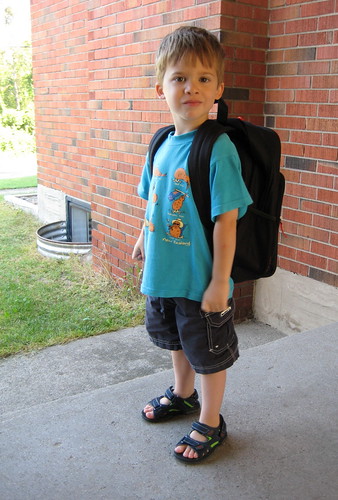 |
|
|
Last week, I attended an online conversation organized by The Future of Education‘s Steve Hardagon. A master of community forming, Steve’s smarts and ability to be perpetually on the edge of the web’s social potential have earned him the respect of many educators, including the audience of listeners that night, who had the privilege of hearing Anne Schreiber (Curriki), Karen Fasimpaur (of Handheld fame and K12 Open Ed), and, contributing to the conversation, Rushton Hurley (NextVista).
I find the whole notion of teacher generated and shared educational materials and content to be absolutely fascinating. This is not just because of our emerging capacities to generate, organize, and distribute these resources, but also because of the progress-stifling nature of our prevailing textbook publishing industry. One of the panelists said, in the conversation, that
“The textbook industry is almost the enemy of education today…”
There are a number of projects out there that are trying to build and promote a willingness among educators to share the materials and strategies. It was one of the key points of the conversation, the question, “How do you get teachers to share.” It’s interesting that on several occasions at the Pennsylvania One-to-One conference this previous week, people were talking about the eagerness with which teachers share. But many perceive a resistance among teachers to collaborate, which is likely a throwback to teaching as a solitary endeavor which took place in isolation in your room. Could it be that One-to-One initiatives are raising a school culture, of which sharing is a component?
Six Open Content Projects Compared by OER Commons 1
|
That aside, one element of the open content conversation that I have to take some exception to is the repeated urging that repositories of teacher-submitted resources be vetted by a higher level of authority. I understand why this line is being delivered — why it is perceived as a selling point. As an institution, we are still tied to the stamp of authority that the publishing industry seems to represent — psychologically addicted to pre-packaged content with a users’ guide.
I’m not entirely against packaged content for classes or even published textbooks — when they are the most appropriate and relevant resource. What I would promote is a resource repository that bases its authority on the teachers who contribute to it and the teachers who use it.
Whether you consider it part of contemporary literacy, as I do, or information skills, the ability to evaluate information, select, and fashion products of value is now a basic skill, which our students must learn. Shouldn’t teachers be modeling these skills, and wouldn’t the selection of resources for the classroom give them an ideal opportunity to say, “This is why this reading is appropriate for our goal.”
I would like to see an open content services that acts kind’a like a set of Legos, where a variety of pieces are submitted by practicing teachers (and even pre-service teachers), vetted and rated by the community of participating educators, and then carefully assembled into learning products by teachers for their students.
“Creating, Doing, and Sustaining OER: Lessons from Six Open Educational Resource Projects.” OER Commons. Sep 2008. OER Commons. 4 May 2009 <http://wiki.oercommons.org/…>.


“Open is as open does”??
The desire for a Lego-like open content service harkens a bit back to learning objects, a grand dream not fully realized. There is a bit of overhead in the rating process (oh and do we have to vet the raters? sigh) and really sometimes the lego pieces just don’t fit well.
I have semantic dreams that the re-use of and context of re-use itself could be harvested like a flickr “interestingness” rating.
I agree about the rating. I’m think of something more simple, like Flickr, as you say. It might also be interesting to give contributors an index of value, based on rating and uses of their materials.
You have a point. I would like to see the professional organizations for various subjects become more active in developing realistic curriculum continua. The National Council of Teachers of Mathematics is, so far, the best. There should be an overall framework of what we expect students to know at each grade level in each subject, and then teachers could contribute specific effective methodologies. We could call in authorities from all levels of culture to help establish these criteria, which should certainly include flexibility, creativity, and empathy. For example, I would like to see all students exposed, early and often, to theater games.